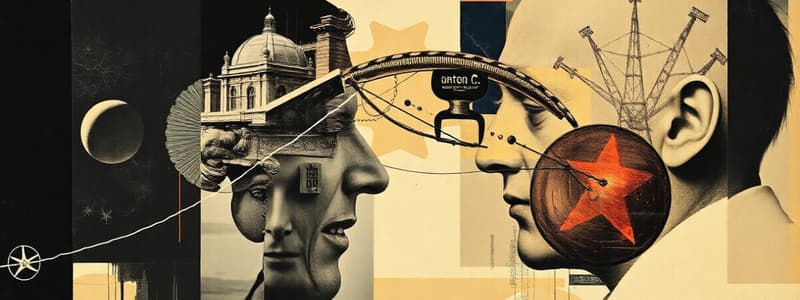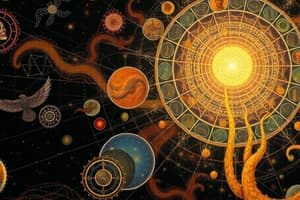Podcast
Questions and Answers
What is one of the main goals of psychology?
What is one of the main goals of psychology?
- To control the human mind
- To describe human behavior (correct)
- To compare psychological theories
- To illustrate human emotions
Which type of psychology was Carl Gustav Jung known for founding?
Which type of psychology was Carl Gustav Jung known for founding?
- Analytical psychology (correct)
- Behavioral psychology
- Developmental psychology
- Cognitive psychology
What does the concept of 'collective unconscious' refer to?
What does the concept of 'collective unconscious' refer to?
- The social interactions between people
- The shared insights of humanity (correct)
- A person's conscious feelings
- Individual dreams and thoughts
Which of these archetypes represents the darker, repressed aspects of an individual's personality?
Which of these archetypes represents the darker, repressed aspects of an individual's personality?
What component of the 'Me self' refers to possessions and affiliations of a person?
What component of the 'Me self' refers to possessions and affiliations of a person?
Which archetype symbolizes wisdom and the understanding of life's mysteries?
Which archetype symbolizes wisdom and the understanding of life's mysteries?
Which characteristic is typically associated with the 'I self' as defined by William James?
Which characteristic is typically associated with the 'I self' as defined by William James?
What is suggested by the nature-nurture controversy in psychology?
What is suggested by the nature-nurture controversy in psychology?
Which archetype is known to represent the female aspect in men?
Which archetype is known to represent the female aspect in men?
What does the 'social self' component of the 'Me self' emphasize?
What does the 'social self' component of the 'Me self' emphasize?
What does the concept of the 'ideal self' refer to?
What does the concept of the 'ideal self' refer to?
Which self-concept involves understanding one's true attributes and traits?
Which self-concept involves understanding one's true attributes and traits?
Which of the following terms is associated with Murray Bowen?
Which of the following terms is associated with Murray Bowen?
What is self-efficacy primarily concerned with?
What is self-efficacy primarily concerned with?
Which statement best describes the 'false self' according to Donald Woods Winnicott?
Which statement best describes the 'false self' according to Donald Woods Winnicott?
Which of the following is NOT a feature of human agency as defined by Albert Bandura?
Which of the following is NOT a feature of human agency as defined by Albert Bandura?
What aspect of self-discrepancy theory compares one's ideal self to their actual self?
What aspect of self-discrepancy theory compares one's ideal self to their actual self?
According to Bandura's social cognitive theory, knowledge acquisition is derived from which process?
According to Bandura's social cognitive theory, knowledge acquisition is derived from which process?
What does the 'ought self' represent in self-concept?
What does the 'ought self' represent in self-concept?
Which terms best describe the 'spiritual self'?
Which terms best describe the 'spiritual self'?
Which archetype is considered the highest form that represents wholeness and completeness of the self?
Which archetype is considered the highest form that represents wholeness and completeness of the self?
What does the 'shadow' archetype represent in Carl Jung's theory?
What does the 'shadow' archetype represent in Carl Jung's theory?
Which of the following components does NOT belong to William James's 'Me self'?
Which of the following components does NOT belong to William James's 'Me self'?
What influences behavior according to the nature-nurture controversy?
What influences behavior according to the nature-nurture controversy?
Which archetype represents the masculine aspect in women according to Jung's theory?
Which archetype represents the masculine aspect in women according to Jung's theory?
According to Jung, what are archetypes?
According to Jung, what are archetypes?
What aspect of self does the 'social self' address in the context of William James's theory?
What aspect of self does the 'social self' address in the context of William James's theory?
Which goal of psychology involves understanding human behavior in order to apply interventions?
Which goal of psychology involves understanding human behavior in order to apply interventions?
Who is considered the father of analytical psychology?
Who is considered the father of analytical psychology?
Which of the following best describes the 'I self' component in William James's theory?
Which of the following best describes the 'I self' component in William James's theory?
What defines the 'actual self' in the context of self-concept?
What defines the 'actual self' in the context of self-concept?
What does the 'self-discrepancy theory' primarily compare?
What does the 'self-discrepancy theory' primarily compare?
Which of the following best describes 'self-efficacy'?
Which of the following best describes 'self-efficacy'?
Which feature of human agency involves a person's anticipation of outcomes?
Which feature of human agency involves a person's anticipation of outcomes?
What does Carl Rogers' concept of 'ideal self' refer to?
What does Carl Rogers' concept of 'ideal self' refer to?
What characterizes the 'false self' according to Donald Woods Winnicott?
What characterizes the 'false self' according to Donald Woods Winnicott?
In the context of global self, which statement is most accurate?
In the context of global self, which statement is most accurate?
What aspect does Albert Bandura's social cognitive theory emphasize about learning?
What aspect does Albert Bandura's social cognitive theory emphasize about learning?
Which self-concept refers to what one believes they should possess?
Which self-concept refers to what one believes they should possess?
What is considered the highest form of self in the discussion of the spiritual self?
What is considered the highest form of self in the discussion of the spiritual self?
Flashcards
Psychology
Psychology
The study of human behavior and mental processes.
Nature-Nurture
Nature-Nurture
The debate about whether genetics (nature) or environment (nurture) influences behavior more.
Collective Unconscious
Collective Unconscious
A universal part of the unconscious mind containing shared ideas and archetypes.
Archetypes
Archetypes
Signup and view all the flashcards
Persona
Persona
Signup and view all the flashcards
Shadow (Archetype)
Shadow (Archetype)
Signup and view all the flashcards
Anima (Archetype)
Anima (Archetype)
Signup and view all the flashcards
Animus (Archetype)
Animus (Archetype)
Signup and view all the flashcards
I self
I self
Signup and view all the flashcards
Me self
Me self
Signup and view all the flashcards
Spiritual Self
Spiritual Self
Signup and view all the flashcards
Global Self
Global Self
Signup and view all the flashcards
Self-Differentiation
Self-Differentiation
Signup and view all the flashcards
Real Self-Concept
Real Self-Concept
Signup and view all the flashcards
Ideal Self-Concept
Ideal Self-Concept
Signup and view all the flashcards
Self-Discrepancy Theory
Self-Discrepancy Theory
Signup and view all the flashcards
False Self
False Self
Signup and view all the flashcards
Self-Efficacy
Self-Efficacy
Signup and view all the flashcards
Social Cognitive Theory
Social Cognitive Theory
Signup and view all the flashcards
What are the 4 goals of psychology?
What are the 4 goals of psychology?
Signup and view all the flashcards
Nature vs. Nurture
Nature vs. Nurture
Signup and view all the flashcards
What is the 'I Self'?
What is the 'I Self'?
Signup and view all the flashcards
What is the 'Me Self'?
What is the 'Me Self'?
Signup and view all the flashcards
Ideal Self
Ideal Self
Signup and view all the flashcards
Self-Discrepancy
Self-Discrepancy
Signup and view all the flashcards
Ought Self
Ought Self
Signup and view all the flashcards
Study Notes
Understanding the Self
- Psyche/Soul: Psychology studies human behavior and mental processes.
- 4 Goals of Psychology: Describe, explain, predict, and control human behavior.
- Nature-Nurture Controversy: Both genetics and environment influence behavior.
Feminine Side of Men
- Animus: Men's illogical opinions and irrational thinking.
- Great Mother: Archetype of fertility and destruction.
- Wise Old Man: Archetype represents wisdom and meaning.
- Hero Archetype: Unconscious image of a person who conquers evil.
- Self: Highest archetype, representing wholeness.
Carl Gustav Jung
- Analytical Psychology: Theory where certain phenomena or situations can influence lives.
- Collective Unconscious: A segment of ideas in the deepest unconscious mind. All humans share these ideas.
- Archetypes: Unaware of personality, ancient or archaic images derived from the collective unconscious. Examples include; Persona, Shadow, Anima, and the Great Mother, Wise Old Man, and Hero.
William James
- Theory of Self: I-self (Pure Ego) – Self-awareness. Me-self (empirical self) – Separate and distinct object (individual) that refers to own experiences.
- Me-self Components: Material (objects/belongings), social (social interaction/relations), and spiritual (highest form of self).
Self-Concept
- Real Self-Concept: Person's perception of themselves.
- Ideal Self-Concept: The person's perceptions about who they want to be.
- Ideal Self Comparison: Comparing ideal self to actual self.
- Actual Self: Personality, traits, and attributes a person believes they possess.
- Ought Self: Attributes a person believes they should possess.
- True Self: Spontaneous emotions and feelings.
- False Self: Mask of behavior that a person shows to others.
Social Cognitive Theory
- Albert Bandura: Learn from knowledge and observational learning, from our experiences and interactions.
- Modelling: Adding and subtracting behaviors.
- Self-Efficacy: Belief in one's ability to achieve desired outcomes. Self-regulation (monitoring behavior, judging behavior).
- Intentionality, Forethought, Self-reactiveness, Self-reflectiveness: Key features of human agency.
Eastern Thought
- Ecological Self: Understanding humanity and the non-human environment, including plants and animals.
- Confucianism: Ethical principle emphasizes wholeness, goodness, and love.
- Li: Proper conduct shapes individual character and harmony.
- Xiao: Respect for elders and ancestors.
- Yi: Justice, righteousness, and meaning to decide right from wrong.
Studying That Suits You
Use AI to generate personalized quizzes and flashcards to suit your learning preferences.




